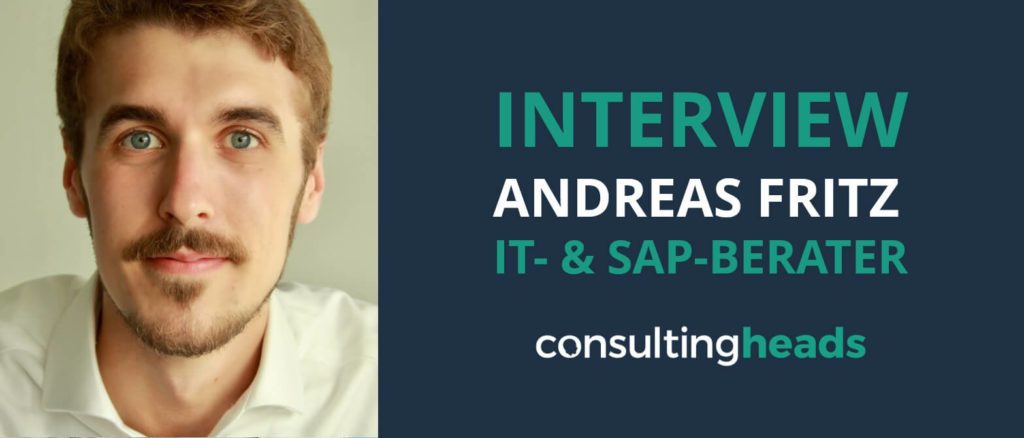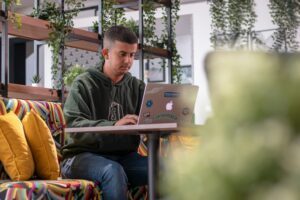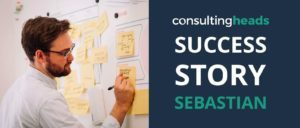Andreas is an IT and business consultant with a focus on SAP security. In an interview, he tells you about his everyday life, what differences there really are between an IT and strategy consultant, and what other projects he masters. Lastly, Andreas gives you an outlook on what three very big changes are in store for the consulting world. Have fun reading!
About Andreas and his career
Would you like to introduce yourself to our users? How has your career been so far?
Andreas Fritz, late 20s, from the Rhineland and I have been a consultant for several years. My customers are mainly IT and audit managers in corporations who want to improve their SAP security. In doing so, I support them from a technical and professional point of view.
It started with me in a management consultancy in my hometown. As a student, I used to help out in IT until they asked me if I would like to come to the customer. That’s how I got my first consulting project at a large telecommunications company in Bonn. That was in 2009. After studying computer science, I then turned consulting into a career.
How did you come to consultingheads and why did you sign up with us? What did you like about our platform?
Out of professional curiosity. While you guys were launching the platform, I was in an application phase. And there’s something innovative about consulting firms that move so quickly on new platforms.
What I like about consultingheads, regardless of the consulting services, is the clear focus on consultants and their needs. By this I mean, for example, the skill match and the resulting personal recommendation.
Andreas Fritz, IT and SAP Consultant
You recently joined adesso, a leading IT service provider. What exactly do you do there, what are your responsibilities and how does a normal working day work for you?
I came to adesso because we are setting up a new range of services for SAP security. In parallel, we are also recruiting new colleagues who are interested in the subject. Overall, a great challenge!
For me, that means a lot of pioneering work now at the beginning, both on the customer side and in finding new colleagues. And for new colleagues: We can shape our own offerings to a certain extent. I find that creative and exciting.
The only regular thing is that away from projects, my days are always peppered with a bit of marketing and sales. So if you are interested in the topic of SAP security … 😉
Differences between a strategy and IT consultant
Apart from the technical aspect, what would you say are three differences between a strategy and IT consultant?
Spontaneously, three points come to mind, but they only reflect my very personal impression :
- Both have a different perspective on things. While the strategy consultant has to look at his cases from many different angles, the IT consultant often has fewer angles in his projects, but a strong focus.
- A key characteristic of strategy consultants is that they are skilled questioners . In most of my conversations with such colleagues, they surprised me with very interesting questions. IT consultants, on the other hand, often have a very iterative approach in their blood. “Try and error” is part of the game for anyone who has ever programmed.
- All the other clichés about strategy and IT consultants are just as true, of course. Without exception! 😉
Digital transformation of own consulting processes
As an IT consultant, you are particularly close to the topic of “digitalization” and support companies in their digital transformation. But what about the consulting processes themselves? Are consultants and consulting firms taking advantage of the wealth of opportunities to automate their own processes as well? What could be improved?
To put it briefly, no. Sometimes we consultants work on so many issues for our clients that our own construction sites get far too short shrift.
I’m thinking, for example, of travel expenses, which can now be recorded fully automatically by apps with artificial intelligence. Or the scheduling of appointments with customers, which are often very cumbersome. The potential that online marketing offers to keep bringing out new prospects is also far from exhausted. So there is still a lot to do!
About mentors and mentoring
Right at the beginning of your career, you were lucky enough to have your first boss take you under his wing – an older gentleman with many years of consulting experience who suffered from Parkinson’s disease. While you were able to support him in his daily work, he mentored you. What do you think was the wisest advice you received from him?
Volker, that was my mentor’s name, lived in Spain and flew to Germany every week. Despite being over 60 years old and having Parkinson’s disease. Every week! He did this not only to work here, but more importantly to stay mentally fit and continue to learn. That left an impression on me.
Since then I have been reading regularly. Previously, I used books as doorstops at most. To this end, I invest a good amount every year in seminars and training. And I’m always looking for new challenges that I can grow with.
Who is your mentor today? Do you have mentees yourself and what would you say are the biggest challenges and responsibilities of a mentor to their mentee?
Currently, I no longer have a single person who I would call my mentor. Instead, I study specific people over several years from whom I am eager to learn a specific topic. It’s different from a relationship with a mentor. It’s a little more tedious at the beginning, but it gets easier and easier as you figure out topics on your own.
Thus, this is also the greatest challenge for a mentor when he sees himself in the role: To preserve the mentee’s independence. For example, a mentor can open many doors and make contacts. But if the mentee doesn’t learn how to do that for themselves over the course of the relationship, the effect fizzles out very quickly.
Although I have always trained new colleagues at work and accompanied them to some extent, I have never seen myself in the role of a mentor.
Blog and consultant training
For three years you have been working as a freelance author and offer Trainings for Junior Consultants an. What originally prompted you to create your Blog and what topics do you cover there?
I didn’t really appreciate all that I learned from Volker at first. It wasn’t until I started working full time in consulting after graduation that I realized that. I realized that others were not fortunate enough to have the opportunity to learn from someone with decades of consulting experience.
The blog was born from that thought. It is designed for consultants who are just starting out at a consulting firm or have been there for a few years. Everything revolves around the consultant life: So experiences I have in everyday life, skills that are helpful as a consultant, business trips, etc. Specifically, it’s about “10 tips for a successful presentation” or “3 entertaining films about consultants“.
Tell us a little bit about your Consultant training! Who takes part here? Are participants selected by you beforehand? How do these two days work?
Again, the idea came from practical experience. During the first few years in consulting, I was able to attend a lot of training and education. However, only a few concepts and ideas from it really helped me in day-to-day project work with customers. If only I had known her in the first few months….
I then took this as an opportunity and packed these so important consulting basics into a two-day training. This is about presenting, organizing yourself and some basics in sales.
Currently, the consultant training is an in-house training for up to eight participants. So it’s aimed at consultancies that regularly get new staff and want to get them up to speed as quickly as possible. If you want to have some details in advance, please contact me directly.
Influence of the “Knowledge Revolution” on consulting
You are someone who loves to share your knowledge with others and thus you also hit the nail on the head. What do you think are the consequences of the “Knowledge Revolution” and democratization of knowledge for the consulting industry? What will change when knowledge, your original main resource as a consultant, becomes increasingly accessible to everyone through the Internet – including your clients?
I see it very similarly. There are, in my opinion, three very big changes there.
We are already noticing the first one (also privately): There is an oversupply of information. A real sensory overload. Thanks to the Internet and search engines, it’s no longer a matter of being able to find a piece of information in the first place. Rather, the challenge is now to select the really appropriate information from the sheer mass of information. Here, additional expertise is already very often needed to make a good decision.
The next difficult step is to also turn this information into knowledge and then transfer it into practice. Companies themselves can do this very well. Only the speed at which this has to happen has increased dramatically. As a result, knowledge that has already been learned quickly falls behind again or cannot be built up sustainably at all. Here, consulting can be just as helpful in taking the step from theory to practice.
And the third change is just now coming our way. Through artificial intelligence or quantum computers, we humans develop things that we ourselves can no longer comprehend. At the same time, however, this will be used in very many areas and companies. To do this, we must make the incomprehensible comprehensible so that we can actually make sense of it. The first consultants with glass balls can already get into position 😉
Thank you very much for the interesting interview, Andreas! We wish you all the best and much success with your projects!






